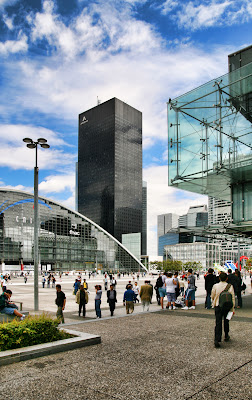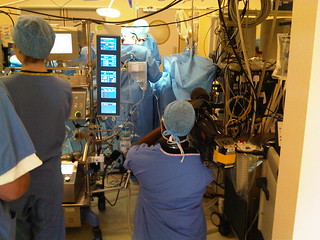The UK is back in the depths of recession. Recovery failed to gain any pull in 2011. In 2011 the economy grew by 0.9 percent for the complete year. And 2012 saw a bad beginning as the economy fell by 0.4 percent in last quarter of 2011 and then another 0.3 percent in first quarter of 2012.This can clearly indicate that UK is in recession. It’s double-dip recession, where an economy goes back into recession again without having a chance to recover from the previous one.
Showing posts with label future. Show all posts
Showing posts with label future. Show all posts
Friday, October 12, 2012
[Guest Post] Top 10 Changes to How We'll Take a Vacation in the Future
Some of these are not too far-fetched, while others will undoubtedly take a lot of achieving and are far in the future, or even unlikely to happen at all.
Monday, September 03, 2012
[Guest Post] What's Ahead for AML Software
 |
| courtesy: africacenter.org |
[Guest Post] What Will Mainstream Travel Look Like in the Future?
 |
| courtesy: ghalegroup.com |
Oh, Hollywood. If it wasn’t for screenwriters and directors with overly active imaginations, would any of us be sitting around even considering the possibility of there one day being flying cars, trains, or buses? Even television shows such as Doctor Who have a lot to answer for in that respect.
One of the biggest problems with looking to the future is that we will, inevitably, be disappointed. When man first landed on the moon in 1969, there was talk that humans would one day live there, and that we would soon be travelling to Mars and colonising other worlds.
Thursday, August 30, 2012
[Guest Post] The Future of Graphic Design Tools: Creative Cloud and More
As a graphic designer, I’m always browsing the web for inspiration and informative articles.
I recently stumbled upon an article from eCollegeFinder, a portal for online colleges, that questioned whether digital design skill stems from education or natural talent. In the article, designer Jim Casa says, “In the digital design field, continuing to learn and grow is a must. To remain successful, a designer has to keep up with changing technology, practices, and trends…” While the article seems to lean towards innate talent being the first step toward success, it got me thinking about how important the advancement of training and technology is to a designer.
So what are the hot topics in the future of design?
Wednesday, August 29, 2012
[Guest Post] Impact of Online Games on the Society in the Future
 |
| Courtesy: technesstivity.com |
Saturday, August 25, 2012
[Guest Post] The Futuristic Home Is Right Now
Posted by
Guest Blogger
Posted on
8/25/2012 11:27:00 pm
Tags:
future,
house,
living space,
plumbing,
smart
 |
| image from: dornob.com |
There have been some a lot of developments in home design over the last few years, and we’re getting ever-so-close to a fully automated house. Of course, as any sci-fi fan will tell you, all of these advancements, while convenient and enjoyable, can’t help but lead to the subjugation and control of all humankind. But at least our pets will be well cared for.
Sunday, August 19, 2012
[Guest Post] Future of Data Integrity
 |
| Image from: innovata-llc.com |
Friday, August 17, 2012
[Guest Post] New Ways To Prevent Alcohol From Ruining A Night Out
| Credit: http://www.flickr.com/photos/duncan |
If
you have recently walked into a public restroom in Michigan (USA) and
heard a voice talking to you from down below, questioning whether you’ve
drunk too much, don’t be too alarmed; you have not been followed in
there by an angry-yet-cautious dwarf. No, instead you may have stumbled
into one of many toilets which are using motion-sensitive urinal cakes
in their fight against the huge number of people deciding to drink and
drive.The effort hopes to get people talking about the issue of driving
while intoxicated, so they become aware of their own behaviour after
having had a few drinks. Often it is hard to measure one’s state of
inebriation as alcohol numbs our sense of self-perception as well as our
ability perceive others and our surroundings properly.
[Guest Post] The Evolution & Future of Satellite Communications
Posted by
Guest Blogger
Posted on
8/17/2012 12:13:00 am
Tags:
communication,
future,
satellite,
space
 |
| Image by DimentionInfo.com |
Friday, August 10, 2012
[Guest Post] Are "City Buildings" the Future of Human Living Space?
Posted by
Guest Blogger
Posted on
8/10/2012 10:44:00 pm
Tags:
architecture,
building,
city,
concept,
construction,
future,
habitat,
house,
living space
 |
| Courtesy: www.sxc.hu |
For the best part of the last 30 years, super tall skyscraper “city buildings” have been envisioned and even fully planned and designed by many organisations the world over. Although none of these have yet to fully come to fruition in terms of housing permanent residents, whose every need can be met within one building – in theory meaning they would never have to leave the construction – there are a number of multi-use skyscrapers around the world that indicate what we can expect if such a building is ever built.
What are the advantages and disadvantages of such buildings, and will the increasing global population reach a point where such constructions are necessary to avoid global overcrowding?
Monday, August 06, 2012
[Guest Post] What Are The Benefits Of Organic Clothing?
Posted by
Guest Blogger
Posted on
8/06/2012 02:24:00 pm
Tags:
clothing,
fabrics,
fashion,
future,
organic
The environment is stretched to its limits. Pollution is on the minds of (many of) the world's leaders.
This has led to some industries adopting a more ecological standpoint when producing goods. While fashion hasn't always been known for its adherence to environmental issues, there are some brands who have begun to do something about it. There have been major developments in the clothing industry, with products for adults and organic children's clothing now found more frequently in stores.
Sunday, August 05, 2012
[Guest Post] Climate and Weather Trends
Posted by
Guest Blogger
Posted on
8/05/2012 11:55:00 pm
Tags:
climate,
future,
planet health,
pollution,
weather
 |
| Courtesy: TopNews.in |
Climate and weather trends will be impacted over the next 500 years based on current pollution trends and observations scientists are making now. Over the last few centuries, the climate has been affected from many human activities. The two major factors that have altered the atmosphere are rising carbon dioxide levels in the atmosphere and the removing of vegetation. The elevated carbon dioxide levels will directly contribute to a rising average temperature over the next 500 years, in turn directly impacting the global warming. As humans are removing vegetation in order to create developments and more, there is less solar energy absorbed from the atmosphere. Also, vegetation helps recycle moisture back up into the atmosphere. Over the next 500 years, scientists are predicting a higher average temperature, a higher sea level, stronger natural disasters, and affected water supply/droughts. Humans can alter these current pollution trends and produce a different outcome by changing their behaviors and habits. As a population, we need to stop deforesting and removing vegetation as it is a pivotal piece to our weather and maintaining climate patterns over time. Also, we must come up with clear gases and emission as carbon dioxide and more are severely affecting our atmosphere and climate.
Saturday, August 04, 2012
[Guest Post] What will the planet look like in 100 years?
Posted by
Guest Blogger
Posted on
8/04/2012 01:07:00 pm
Tags:
alternative,
architecture,
concept,
food,
future,
habitat,
life,
transport,
vehicle
Last week, my PC decided to give up the ghost on me. What does this have to do with the future I hear you ask? Well, as a back-up, my flat-mate dug out his iMac (circa 1999), and it got me thinking. The design, software and functionality of it seemed ancient when compared to modern Macbooks, yet there has only been 13 years in between the two. What then would the world be like in 100 years of further technological advancement, human expansion and, inevitably, depleting resources? How would buildings look, what would we be eating, how would we get around, and would we still be here?
 |
| Image courtesy: Telegraph.co.uk |
In 100 years, the earth will be a very different and probably unrecognizable place. With the Russians suggesting that human immortality is only 45 years away, the human population exploding at an unmanageable rate, and the livability of vast areas of our planet decreasing by the year, Earth is in dire need of some radical change!
Wednesday, August 01, 2012
How will the Battery Charge our Future
This article was originaly posted at Howzzit.com.
As technology advances, one of the basic components of a machine that has changed the most is the battery. Whether that’s a car battery, a phone battery, a laptop battery, or batteries in many household items — the trend is to provide longer lasting life and a smaller, lighter battery. So what will the future of batteries be?
The Future of Automobiles and the Role of Software
Posted by
Unknown
Posted on
8/01/2012 11:15:00 am
Tags:
automobile,
cars,
EXTERNAL,
future,
software
This post was originally published on CravingTech.
It is hard to think of an aspect of life which hasn’t been affected by software.
The automobile industry is far from an exception, with software likely to play a pioneering role in defining the next set of advancements. This article explores the present status of software in this realm and what it heralds for future cars.
Telemedicine: The Future of Medical Care
Posted by
Unknown
Posted on
8/01/2012 10:51:00 am
Tags:
communication,
EXTERNAL,
future,
health,
medicine
This article was originally published in www.UnTwistedVortex.com
 With current technology making the impossible possible, we see more and more invention in the world of medicine. Imagine getting your vitals taken with an app on your smart phone then sending your vitals to a specialist center within the matter of seconds. The possibility for connection, access and communication become expansive. Telemedicine is the newest and latest medical technology hybrid to emerge. Our generation will have the exciting position of seeing the present and the future butting up against each other as telemedicine alters the way medicine is practiced. What is telemedicine and will it become the future of medicine in every way?
With current technology making the impossible possible, we see more and more invention in the world of medicine. Imagine getting your vitals taken with an app on your smart phone then sending your vitals to a specialist center within the matter of seconds. The possibility for connection, access and communication become expansive. Telemedicine is the newest and latest medical technology hybrid to emerge. Our generation will have the exciting position of seeing the present and the future butting up against each other as telemedicine alters the way medicine is practiced. What is telemedicine and will it become the future of medicine in every way?Friday, July 27, 2012
Is Our Future Several Feet Under? (Part 1)
Posted by
Unknown
Posted on
7/27/2012 12:08:00 pm
Tags:
concept,
exotic,
future,
habitat,
hotel,
house,
resort,
underwater
Let’s
face it - life began under water. That automatically makes one suppose
that life is more easily sustainable beneath water. While people would
naturally be uneasy about it, there are actually plans and designs -
even construction - going on, for underwater habitats.
So
what are underwater habitats? These are structures completely or
partially beneath the water level in which people can live for extended
periods, maybe all their lives, and carry out most of the basic
day-to-day activities, such as working, resting, eating, visiting the
toilet, and sleeping. All while surrounded by marine environment.
Many
underwater habitats have been designed, built and used around the world
since the early 1960s. Mostly always they were used as research
centers, or exploration base, but most of these lacked regenerative
systems for air, water, food, electricity, and other resources. However,
recently some new underwater habitats allow for these resources to be
delivered using pipes, or generated within the habitat, rather than
manually delivered. Well, some are actually built for tourism and
recreation!
Subscribe to:
Comments (Atom)






